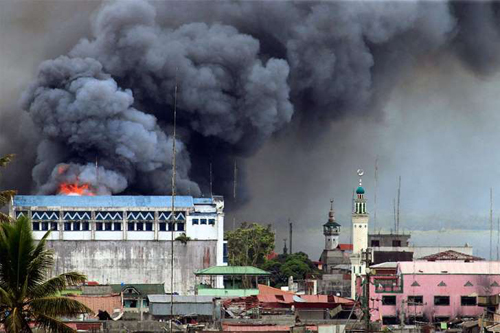
World Watch Monitor reports…
Catholic Bishops in the Philippines have called for the end of the crisis in the southern city of Marawi in the southern region of Mindanao that – they say – “is not a conflict of religion”.
“We heard and read truly amazing stories of how the Muslims protected us and helped Christians avoid an almost certain death. Now Christians are helping thousands of Muslims who have fled from Marawi. These are indisputable signs that there is no religious war”, they said in a statement issued at the end of their episcopal conference in Manila on Monday.

NOT A RELIGIOUS CONFLICT: Marawi City has been the scene of some fierce fighting over the past couple of months. PICTURE: Mark Jhomel/Via Wikipedia/CC BY-SA 4.0
Agenzia Fides reports that “the bishops, alongside Mindanao Islamic religious scholars and leaders, deplore the ‘violent extremist group of Maute in Marawi, who, swearing allegiance to Islam, contradicted the fundamental principles of Islam by abducting and killing innocent people’”.
The bishops make no mention of members of their church who have been held hostage by the IS-affiliated group since it started besieging Marawi on 23rd May. Among them is the Catholic priest Teresito Soganub who was captured together with a number of others when the militants invaded his church in Marawi.
He has since then been seen alive and the Maute group have offered his release in exchange for the parents of their leader Abdullah Maute.
Earlier the Catholic bishop in Marawi, Bishop Edwin de la Pena, made it clear that he will not negotiate for the release of his priest, Fr Soganub, as he dismissed the idea as “ridiculous”.
Speaking at a gathering of church members in the northern province of Pangasinan, Bishop de La Pena said “there is no way we can dialogue” with extremists and that “we can only dialogue with like-minded people”, the Catholic news agency UCAN reports.
His statement is in line with the position of the Philippine government which has said that it does not want to deal with terrorists.
However, speaking to Agenzia Fides, the bishop was quoted as saying that he is hoping for negotiations to take place “with an inclusive approach, which is supported by civil society in Mindanao”. A meeting between Christian and Muslim leaders, the Bishop-Ulama Conference (BUC), has suggested to the government to take “an inclusive approach to resolve the crisis, involving Islamic leaders and placing them in the forefront of negotiations”.
Fides also reports that in different parts of the Philippines interreligious initiatives have started. In Cebu for example, an island north of Mindanao, “Muslim communities have invited people of different faiths to ‘respect and love each other’ to promote peace”.
Also the church and local Islamic leaders held an interreligious prayer meeting in the Basilica of the Holy Nine in Cebu city.
Meanwhile in Quezon City, Manila, an estimated 800 kilometres north of Cebu Island, at least a thousand Muslims and Christians gathered to pray together in a show of unity at noon on 7th July.
In a surprise turn of events last week the Philippines’ largest Muslim rebel group backed a fatwa – an Islamic legal ruling – against violent extremism issued by a senior Islamic religious leader in the troubled southern region of Mindanao.
Sheikh Abehuraira Abdulrahman Udasan, mufti of the influential Bangsamoro House of Opinion in Mindanao warned of “an urgent need to fight violent extremism or radicalism, in compliance with the injunction of the Quran and the prophetic tradition”.
Islam arrived in the Philippines before Christianity, in the 13th and 14th centuries, while the Catholic faith did not arrive until the Spanish came in the 1500s. Mindanao, where Marawi is located, remained largely Muslim and “its religious balance was tipped in favour of Christianity only due to resettlement programs started during the US colonial period in the early part of the twentieth century and accelerated after World War II”, according to a Reuters’ article.
It continues describing how Muslims in the south of the island do not consider themselves Filipino and how they are deeply suspicious of US activities here: “…signs reading ‘US troops out’ are dotted around Marawi”.
In 1980 Marawi proclaimed itself an “Islamic City” and it is the only city in the country with that designation. Catholics account for around one per cent of its 180,000 population but life in the city was until recently peaceful and prosperous as Muslims and Christians were living together as friends, according to Bishop de la Pena; it was a place where, in addition to Christian festivals such as Easter and Christmas, schools in the city got the entire month of Ramadan off and where Father Soganub’s modest cathedral did not have a cross outside as “people here don’t want a large symbol”, the priest was quoted as saying.





